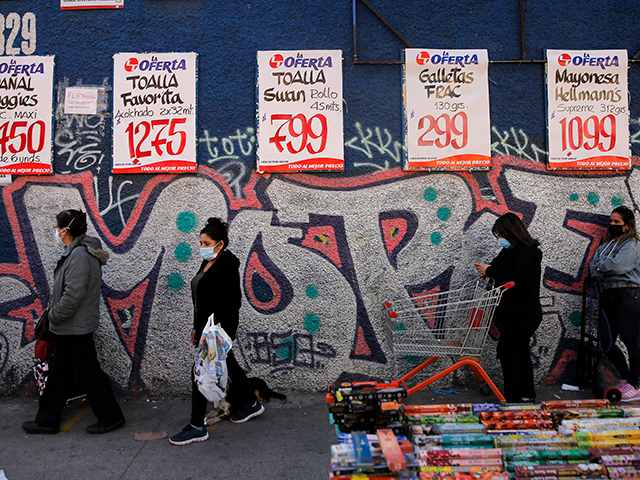The Ministry of Health of Chile announced on Thursday a plan to fully lock down the greater metropolitan area of Santiago, the nation’s capital, in response to an accelerating surge of cases of Chinese coronavirus.
For much of February, March, and April, Chile received near-universal praise from the rest of the world for its extremely high vaccination rates. As of Tuesday, Chile’s Health Ministry has identified about 8.5 million people in the nation as “fully vaccinated,” meaning they have received the total number of doses, usually two, the vaccine product they used requires. Chile is a nation of nearly 19 million people. The Health Ministry applauded itself on Tuesday for reaching 74 percent of its target vaccination population of 15.2 million with at least one dose of a coronavirus vaccine. About 59 percent of the population generally has received at least one dose of any coronavirus vaccine.
Nearly 80 percent of the coronavirus vaccine doses administered in China are of products made in China, primarily the vaccine developed by Sinovac Biotech. Epidemiologists and other experts have identified the poor performance of Sinovac as a likely culprit for the rise in cases. The head of China’s Center for Disease Control, Gao Fu, warned in April that Chinese-made coronavirus vaccines “don’t have very high protection rates.”
Chile is currently in its autumn season and entering winter, the reverse of the Northern Hemisphere. Scientists who believe the spread of Chinese coronavirus may be seasonal have suggested the return of cold weather may also be hurting the nation’s coronavirus response.
Chile’s Health Ministry documented 7,716 new cases and 198 deaths attributed to Chinese coronavirus on Thursday, prompting the government’s announcement that the entire Santiago metropolitan area would go into quarantine on Saturday at 5 a.m. local time. Chile has recorded 1.4 million cases of coronavirus since the pandemic began and 30,472 deaths.
Health Ministry official Paula Daza acknowledged the intensity of calling for a lockdown of the capital on Thursday, stating the move was necessary given “the situation regarding [hospital] beds that we are currently living.” Daza attributed some of the increase in case to the fact that the weather had become colder and “people tend to be inside more.” Scientists have discovered through studies in the past year that outdoor transmission of coronavirus is far less likely than in situations where large numbers of people spend extended periods of time indoors.
Minister of the Interior and Public Safety Rodrigo Delgado also defended the measure to lock down the capital in public, dismissing an uproar from several opposition political parties against the move, one of which referred to it as “absurd.”
“Taking care of people’s health is never absurd,” Delgado said in an interview with Chile’s T13 network. “We have to take measures sometimes that we understand may be rejected even by our [political] sector. This is not a partisan decision, this is not a decision that has to make happy one factor or another, or even our coalition, it is a decision that has to take care of people’s health.”
Among the loudest critics have been members of two of Chile’s conservative parties, the Republican Party and the Independent Democratic Union (UDI) – of which Delgado is a member. The UDI issued a statement condemning quarantine measures generally, arguing that they have “not yielded the expected results” while devastating the Chilean middle class, particularly business owners who cannot function normally. The UDI proposed a series of countermeasures including a KN95 mask giveaway and full freedom of movement for vaccinated people.
The head of the Republican Party, José Antonio Kast, issued a statement calling the current regime a “sanitary dictatorship” and accused the administration of centrist President Sebastián Piñera of “drowning entrepreneurship, liquidating businesses, impeding learning, and stranding the country.”
Brazil’s O Globo published an article citing experts on Friday suggesting that the situation in Chile should lead to further scrutiny of China’s “Coronavac,” given the outsized role it has played in Chile’s vaccination strategy. The World Health Organization (W.H.O.), the newspaper noted, found that Coronavac was only 51-percent effective in stopping infections, and this was slightly higher than the results of clinical trials at Brazil’s Butantan Institute. Studies in Chile found the vaccine to be 67-percent effective if not counting asymptomatic infections, a result that a Chilean health official described as a “disappointment” in April. The Piñera government nonetheless stood by the product at the time, when cases slowly began to rise in the country, raising concerns about the success of the vaccination program.
Chile has since approved several other vaccine products: an experimental Chinese product by the firm CanSino, the controversial vaccine candidate from European firm AstraZeneca, and two American vaccines by Pfizer and Johnson & Johnson, the latter approved for distribution on Thursday. Chile purchased 600,000 doses of the latter through the W.H.O.’s Covax program, meant to create easier access to coronavirus vaccines for underdeveloped countries.

COMMENTS
Please let us know if you're having issues with commenting.